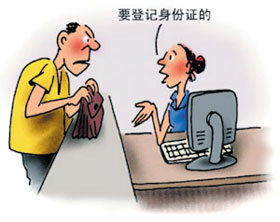博客实名新动议:后台实名前台匿名
[ 2006-11-30 09:07 ]
|
中国互联网协会理事长胡启恒院士日前透露,中国正在探讨和逐步试行在网络世界实行有限实名,以平衡个人隐私和公众利益与国家利益。有限实名即“后台实名”,当一个用户要到博客网站或BBS网站注册帐号时,需提交身份证、必要的证件和真实姓名,而在前台,用户可以使用自己喜欢的名称,而不是真实姓名。 |
|
 |
| A new
system is likely to be adopted, requiring Chinese netizens to submit
information like real names and ID card numbers when they register a blog
or a BBS. |
Officials with the Internet Society of China (ISC) have confirmed that China
is exploring adopting a real name
system in parts of the Internet, Shanghai-based Oriental Morning
Post reported Wednesday.
Hu Qiheng, chairman of the board of directors of the ISC, was reported to
have said on Tuesday at Info China 2006 in Beijing that China is making attempts
to strike a balance between individual privacy and public interests.
"The past understanding of privacy is too absolute. Not only China, but also
the whole world, should realize the necessity of balancing individual privacy
and public and national interests," he said.
A new system is likely to be adopted, requiring Chinese netizens to submit
information like real names and ID card numbers when they register a blog or a
BBS (Bulletin Board Service) account.
Netizens will be able to continue choosing their own online name, and as long
as they do not violate laws their personal information will remain private and
safe.
The first area for real name application will be blogs, a popular form of
internet-based diary.
Blogs have been used by some people to infringe
upon other people's privacy and rights.
As a blogger's real name is unknown, it is very difficult to safeguard
privacy and rights.
The society, affiliated to the Ministry of Information Industry, was
entrusted by the ministry to form a blog research panel to provide solutions for
the development of China's blog industry.
The real name system is said to be able to protect law-abiding netizens'
privacy.
Yang Junzuo, secretary-general of ISC's self-discipline working commission,
was quoted by Beijing-based China Times a month ago saying that the real name
system is the solution.
"Free speech on the Internet does not include talking nonsense and not taking
responsibility. Bad symptoms will be curbed," he was quoted as saying.
Hu was quoted as saying that the direct purpose of
improving the Internet environment is to enable the young generation to grow up
in an Internet-friendly environment like youth in developed
countries.
(China Daily)
Vocabulary:
real name
system:实名制
infringe
upon:侵害(权利、利益)
(英语点津陈蓓编辑) |